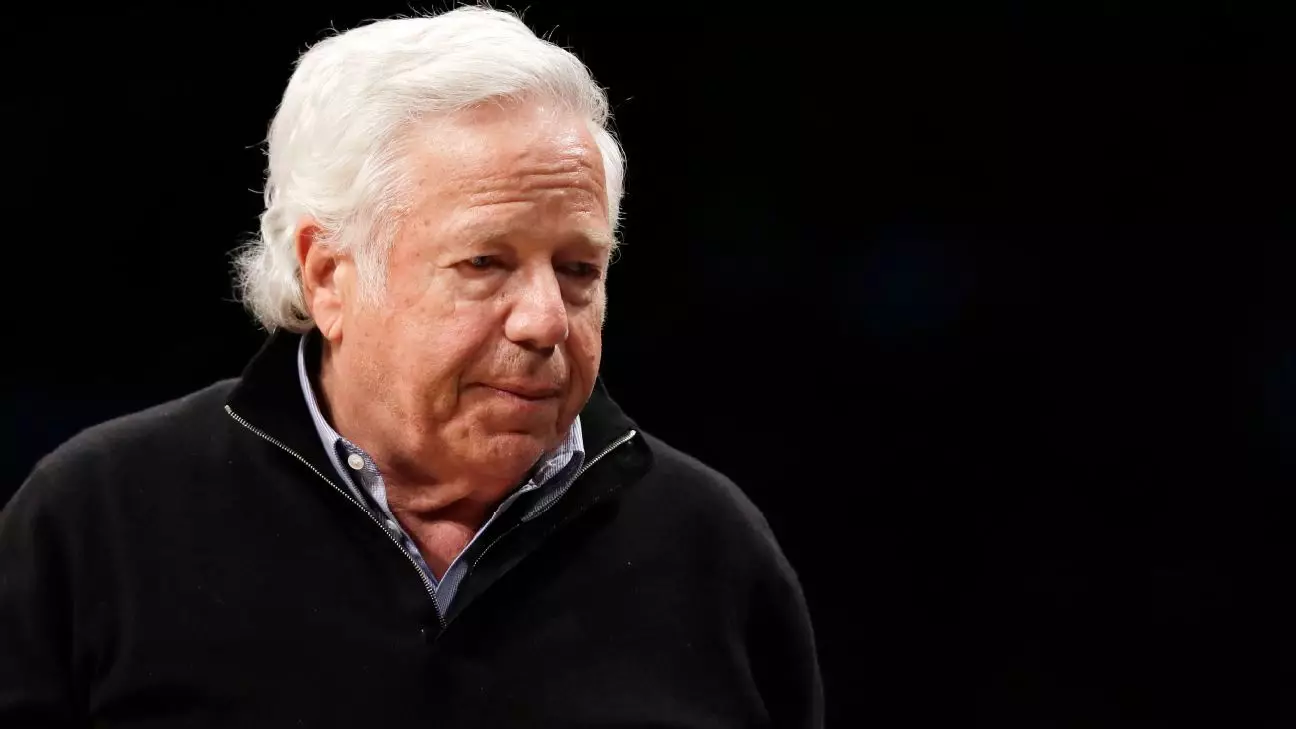The Pro Football Hall of Fame has long been a revered institution within American sports, honoring those who’ve made indelible marks on the game of football. However, its selection processes often stir controversy, as seen in the recent choice made by the Hall’s contributor committee. This year, Robert Kraft, the New England Patriots‘ owner with a storied legacy, was once again overlooked for induction. The committee instead put forth the name of Ralph Hay, an early figure in NFL history. This decision raises questions about legacy, merit, and the dynamics of Hall of Fame politics.
Robert Kraft’s tenure as owner of the New England Patriots saw the franchise transform from a struggling team into one of the sport’s powerhouses. With a record six Super Bowl titles under his belt, Kraft has quite literally changed the face of football in New England. What makes his exclusion from the Hall of Fame perplexing is not just his accomplishments, but the significant strides he made in the modern era of the NFL. As Kraft contemplates his 13th year of consideration by the Hall, many are left to ponder the nature of the contributions that are being recognized.
In contrast, Ralph Hay’s accomplishments as a pioneer in the early 20th century set the groundwork for the NFL, but his brief ownership of the Canton Bulldogs and previous assertions against player compensation paint a less progressive picture. Critics argue that the football landscape has evolved, and thus, perhaps it is time to advance individuals who have actively contributed to the sport’s growth in recent decades.
The nine-member contributor committee’s decision to endorse Hay instead of Kraft indicates a broader narrative about who is seen as deserving of the Hall of Fame honor. The committee’s choice to spotlight historical figures rather than modern-era stalwarts can be interpreted in several ways. Some voters expressed shock at Kraft’s exclusion, suggesting that the committee’s decision was not based on merit but rather an adherence to nostalgia that undervalues contemporary contributions. This is particularly striking given how the Hall of Fame structure was re-evaluated to better highlight contributions from owners and other significant figures in the sport.
Additionally, the sentiment among voters that Kraft would have an „easier path to induction“ after the committees were divided indicates that there were expectations for recognition that have yet to materialize. The Hall of Fame’s policy of requiring at least 80% approval from voters for induction is a high bar, yet many still wonder why it hasn’t favored Kraft more strongly in recent years.
Kraft has benefited from a long-standing campaign by his supporters for induction, with significant pushes emerging since 2012. This has included efforts from staff, including longtime spokesperson Stacey James, who previously championed his cause vigorously through outreach and extensive lobbying. However, conflicting reports suggest that there was minimal pushback this year, leading to speculation about a waning support network.
As illustrated by the recent reactions to Kraft’s continued absence from the Hall of Fame considerations, it seems his supporters perceive this as a matter of justice. As Hall of Famer Bill Polian aptly noted regarding Kraft’s qualifications, it is puzzling to find him lacking recognition given his comprehensive track record serving not only as an owner but as an innovator and collaborator in the league during critical years.
The contrasting backgrounds of Kraft and Hay provoke a necessary discussion about what defines greatness within the context of the Hall of Fame. Do inductees represent the triumphs of their eras, or are they honored purely for their foundational efforts? While Hay certainly played a crucial role in establishing the NFL, the argument among many is that Kraft’s contributions have been far more significant in creating a sustainable and successful business model in the modern age.
Compounding the issue is the growing narrative that while historical figures like Hay are being endorsed, modern-day franchises benefit from the advancing vision of owners like Kraft. The cumulative economic and cultural impact that Kraft has had on the NFL cannot easily be dismissed. His decisions have not only sculpted an iconic team but have transformed the NFL brand as a whole, leading to unprecedented proliferation and commercialization.
As the NFL season progresses and anticipation grows over the announcement of finalists, one must consider what this means for Robert Kraft and the evolving canvas of professional football. With still an opportunity for 2025, Kraft’s narrative continues to unfold amid a backdrop of mixed judgment from the Hall of Fame committee. The shifting dynamics of who gets celebrated, and how their contributions are evaluated will surely remain a topic of heated discussion.
The ongoing saga regarding Kraft’s candidacy for the Hall of Fame raises profound questions about recognition and the criteria used to evaluate contributions in sports history. While Robert Kraft may not yet have a bronze bust in Canton, the conversation surrounding his absence is indicative of a larger debate about the legacy of the NFL itself and the individuals who shape its future.


Napsat komentář